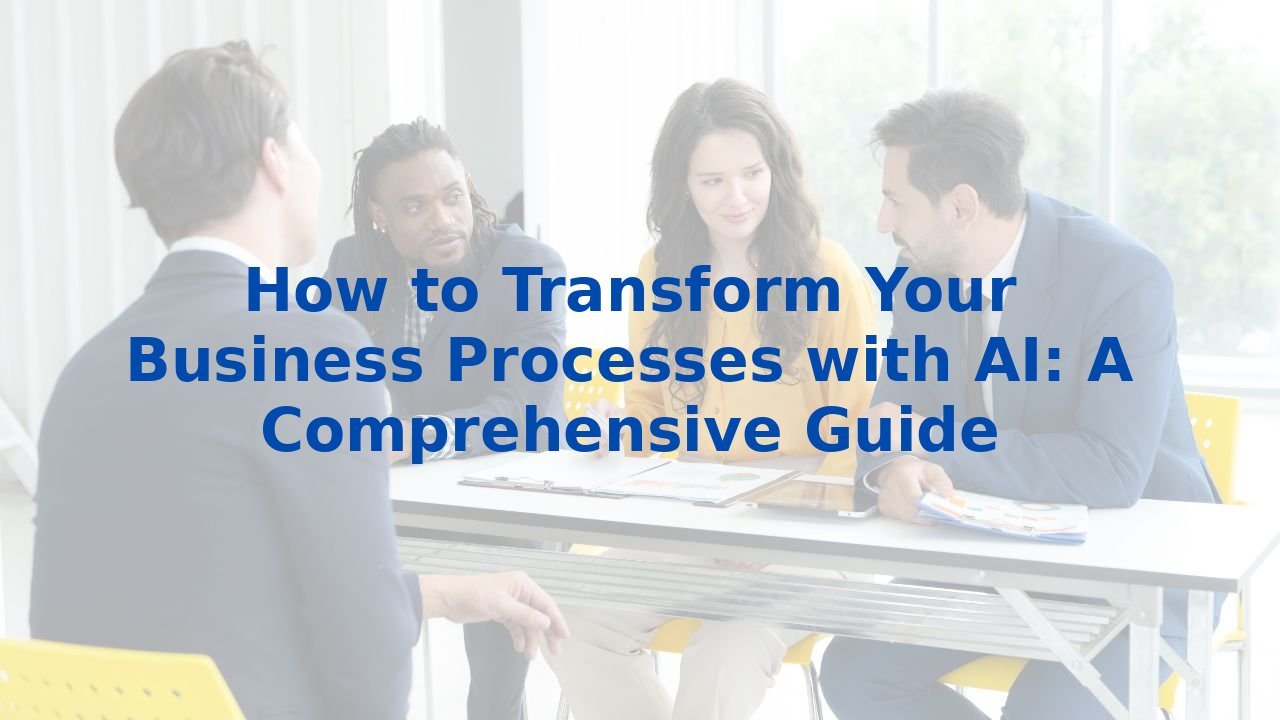How To Transform Your Business Processes with AI: A Comprehensive Guide
How To Transform Your Business Processes with AI: A Comprehensive Guide
In today's rapidly evolving landscape, the drive for efficiency and innovation demands that organizations adapt and optimize their operations. Enter Artificial Intelligence (AI): a game-changing force that can profoundly enhance business processes. This comprehensive guide explores how AI can act as a catalyst for efficiency and effectiveness within your organization.
Improving Meetings
Meetings are a necessary part of organizational life, yet they often become laden with tedious administrative tasks. Imagine a scenario where AI tools dynamically handle scheduling and note-taking. Voice assistants can seamlessly schedule appointments, while intelligent assistants can synthesize key takeaways and action items, ensuring nothing falls through the cracks. This not only boosts productivity but also fosters a culture of accountability and clarity within teams.
Enhancing Sales and Marketing
In the realm of sales and marketing, AI serves as a powerful ally. Through advanced analytics, AI-driven CRM solutions can pinpoint high-potential customers and predict revenue opportunities. This allows sales teams to direct their efforts where they matter most. Chatbots, too, are revolutionizing customer engagement by providing immediate support, ultimately driving revenue through enhanced customer interactions. Understanding the insights provided by AI in this domain can redefine your approach to customer relationships.
Assessing and Improving Customer Service
The quality of customer service can make or break an organization's reputation. AI-driven solutions can automatically evaluate service interactions, identifying problematic calls with remarkable accuracy. By streamlining quality assurance processes, companies can elevate customer satisfaction while ensuring a consistent standard of service across all interactions.
Improving Product Development Processes
AI is also breathing new life into product development. Generative design technologies enable designers to input objectives and constraints, with AI generating multiple design alternatives. This eliminates the pitfalls of creating unviable prototypes, saving valuable time and resources. The speed of iteration fosters a culture of innovation, leading to more effective products that meet market demands.
Automating Content Generation
The demand for engaging content can be overwhelming, but AI rises to the challenge. Automation tools can churn out thousands of lines of copy in seconds, making content creation more efficient and cost-effective. For organizations grappling with content demands, AI opens the door to scalable, on-brand communication without sacrificing quality.
Streamlining Business Processes
AI is reshaping business process management (BPM) through simulation and optimization. By analyzing historical data, AI identifies patterns and potential bottlenecks, allowing organizations to simulate scenarios and make data-informed adjustments. This kind of foresight enables companies to enhance performance indicators, ultimately leading to lower costs and improved lead times.
Real-Time Monitoring and Decision-Making
Timely decisions are vital for competitive advantage in today's business environment. AI provides real-time insights into ongoing processes, allowing immediate intervention when necessary. This proactive approach can be critical to addressing challenges and seizing new opportunities. The capacity for complex decision-making is heightened, as AI analyzes both structured and unstructured data to recommend optimal paths forward.
Automating Manual Tasks
Manual tasks such as data entry and customer query handling can be labor-intensive and prone to error. With the advent of robotic process automation (RPA), powered by AI, organizations can automate these functions, significantly increasing efficiency. Intelligent document processing (IDP) eliminates manual work, allowing employees to focus on strategic initiatives that drive growth rather than getting bogged down in routine tasks.
Continuous Improvement Through AI
One of the most impactful benefits of AI is its capacity for continuous improvement. By providing ongoing feedback and performance metrics, AI creates a feedback loop that helps organizations refine their processes over time. This iterative optimization ensures that BPM strategies evolve alongside organizational goals and market conditions, fostering sustainable growth.
The Power of Employee Training
While AI offers transformative potential, the human element cannot be overlooked. Training employees to work effectively with AI technologies is critical. Empowered employees can:
- Enhance collaboration by understanding how to integrate AI tools into their workflows.
- Make informed decisions based on better data analytics.
- Adapt swiftly to new processes and technologies, keeping the organization agile.
- Maximize automation benefits, thereby increasing overall productivity.
Investing in AI training is an investment in your workforce’s future. Not only does it leverage technology’s potential, but it also empowers individuals to become champions of change within your organization.
Conclusion
Artificial Intelligence is more than just a technological advancement; it is a profound shift in how businesses operate. By embracing AI across your processes—from meetings to product development—you can unlock unparalleled efficiencies and maintain a competitive edge. Coupled with ongoing employee training, these strategies ensure your organization is not just keeping pace with change, but leading it with confidence.
For those looking to dive deeper into the world of AI and how it can specifically benefit your organization, consider exploring dedicated training programs that equip teams with necessary AI skills. After all, the future belongs to those who can effectively harness the power of technology while cultivating a skilled workforce.



